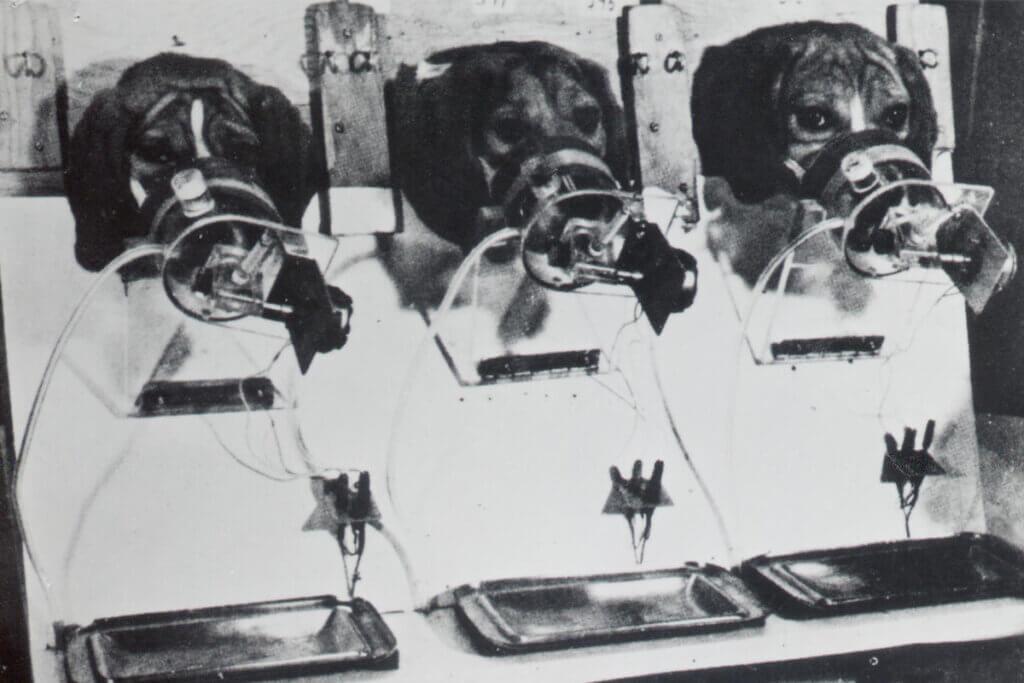It has been known for decades that smoking is harmful and causes deadly diseases. Although animal testing is unlikely to predict this harm, cruel and irrelevant experiments have always been conducted.
In this article you will learn how animals have to suffer in cruel tests for tobacco products and what animal-free testing methods are available.
Aggressive animal testing for tobacco products
In the past, to blow smoke into their lungs, dogs and monkeys would have hoses attached to a hole in their throats, or masks would be attached to the animals' faces. Experimenters applied cigarette tar directly to the bare skin of mice and rats to stimulate the growth of skin tumors.
Animals still suffer today: rats, squeezed into tiny tubes, have to inhale cigarette smoke or e-cigarette vapor for up to six hours a day, five to seven days a week, for several months or even years. Just to show that new tobacco products should be less harmful than cigarettes.
Animal experiments can hardly be transferred to humans
Animals in the laboratory are not exposed to cigarette smoke and e-cigarette vapor in the same way or for similar lengths of time as human smokers. Animal experiments can therefore hardly be used to predict what effects are to be expected on humans.
Different animal species also react differently to toxins. For years, the link between tobacco use and lung cancer in humans went undetected because the results from animal studies did not point to it. No wonder, considering the biological differences between humans and other animals. Here are just a few examples [1]:


In short, it is ethically unacceptable, and from a scientific point of view, no rats or other animals should be misused to predict human reactions to certain substances.
Are animal tests necessary for tobacco products?
Belgium, Estonia, Germany, Slovakia and the United Kingdom have already banned animal testing in tobacco product development. [2-6] However, authorities can still require animal testing for new products such as e-cigarettes if it is unclear what harm they can cause in humans - although the results of animal testing are hardly meaningful for humans. In addition, the ban in Germany does not prevent tobacco companies from conducting the experiments abroad.
Animal experiments in research at universities are also not affected by this ban. Here, the effects of smoking on human health or treatment methods for diseases that occur primarily in smokers, such as COPD or lung cancer, are to be found - but unfortunately in the wrong organism.
In Germany, for example, experiments with cigarettes are being carried out at the University of Ulm: there, mice, some of which had been genetically manipulated, had to inhale the smoke of up to 8 cigarettes, 5 days a week for 3-4 weeks. They were then subjected to hemorrhagic shock and contusion of the lungs, with the banal result that smoking has a negative effect on severe trauma. [7]
The future is cruelty-free
Instead of animal testing, companies can use non-animal (computer and human cell-based) testing. In addition, extensive data from human epidemiological and clinical studies on the health consequences of smoking can be accessed.
Animal-free methods do not fail because of the species-specific differences between humans and other animals and deliver results that are actually meaningful for humans. Among other things, three-dimensional tissue models of the human lung are used. Such tissue can be formed from the cells of donors. Cells from former or current smokers or from patients with smoking-related diseases (e.g. COPD) can be used.
PETA has been campaigning for the end of animal testing for decades, convincing tobacco companies to stop testing on animals and to develop animal-free methods. Various companies such as Imperial Brands, British American Tobacco or Santa Fe Natural Tobacco have now introduced a company policy that prohibits all animal testing unless required by the authorities.
PETA and the PETA science team will continue to work to ensure that tobacco products are not tested on animals.
What you can do
Smoking is bad for our health. Anyone who nevertheless decides to smoke cigarettes or other tobacco products makes this decision in the knowledge of the existing risks. No animal should have to suffer for it!
A goal-oriented, strategic approach is needed to completely end animal experiments – this clears the way for modern research. As an EU citizen, your vote is needed NOW: Help us to collect one million signatures for the European Citizens' Initiative. Ask the EU Commission to work across the EU to phase out animal testing and protect animals from cruel cosmetics and chemical tests.
Help end animal testing now









Test winner at Stiftung Warentest:...
How to get the perfect look for Cos...
Dry elbows: This is how brittle ski...
Cream for Rosacea: The Best Creams